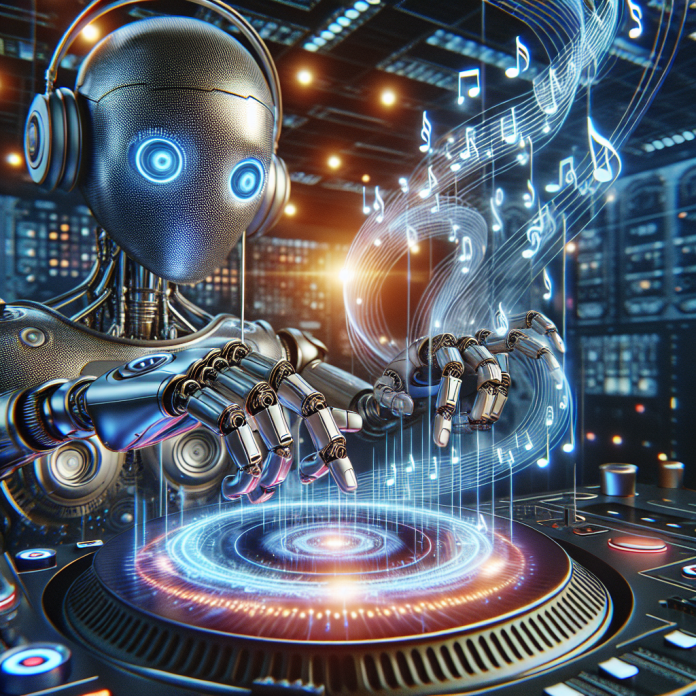AI in the Music Realm: How Artificial Intelligence is Revolutionizing the Music Industry
Imagine a world where music is created not by musicians jamming out in a studio, but by algorithms and data analysis. This might sound like something out of a science fiction movie, but in reality, artificial intelligence (AI) is already transforming the music realm in ways we never thought possible.
The intersection of AI and music is a fascinating topic that is gaining traction in the industry. From creating hit songs to revolutionizing how music is consumed, AI is reshaping the way we experience and interact with music. In this article, we will explore the various ways in which AI is making its mark in the music realm and what it means for the future of music.
## AI and Music Creation
One of the most exciting applications of AI in the music realm is its ability to create music autonomously. AI-powered platforms like Amper Music and AIVA are revolutionizing the music creation process by generating original compositions based on a set of parameters provided by the user. These platforms use machine learning algorithms to analyze vast amounts of musical data and create compositions that rival those of human musicians.
For example, Amper Music’s AI platform allows users to input specific parameters such as genre, mood, and tempo, and generates a full-length, royalty-free track in a matter of minutes. This has enormous implications for musicians, as it allows them to quickly create high-quality music for their projects without the need for a full band or studio session.
## AI and Music Curation
Aside from creating music, AI is also transforming how music is curated and personalized for users. Streaming platforms like Spotify and Apple Music use AI algorithms to analyze user behavior and preferences, curating personalized playlists based on listening habits. These algorithms take into account factors such as song choices, skipping patterns, and time of day to create playlists that are tailored to each user’s tastes.
For example, Spotify’s “Discover Weekly” playlist uses machine learning algorithms to recommend new songs to users based on their listening history. By analyzing factors such as tempo, rhythm, and key, the algorithm generates playlists that introduce users to new music that aligns with their preferences.
## AI and Music Production
In addition to music creation and curation, AI is also revolutionizing the music production process. Platforms like LANDR and AI Mastering use AI algorithms to automate tasks such as mixing and mastering, which are traditionally done by human engineers. These platforms analyze audio tracks and apply a series of processing techniques to enhance the sound quality and clarity of the music.
For example, AI Mastering uses machine learning algorithms to analyze the frequency spectrum of an audio track and apply EQ adjustments to optimize the sound quality. This not only saves time for musicians and engineers but also allows for consistent and high-quality results across multiple tracks.
## AI and Music Analysis
Beyond music creation and production, AI is also being used to analyze and understand music on a deeper level. Platforms like Sync Project and The Echo Nest use AI algorithms to analyze musical features such as tempo, key, and timbre, to understand how music affects human emotions and behavior.
For example, Sync Project uses machine learning algorithms to analyze the impact of music on physiological responses such as heart rate and brain activity. By correlating musical features with physiological responses, researchers can gain insights into how music can be used for therapeutic purposes, such as reducing anxiety or improving focus.
## The Future of AI in the Music Realm
The integration of AI into the music realm is still in its early stages, but the potential for innovation and growth is immense. As AI algorithms become more sophisticated and capable of mimicking human creativity, we can expect to see even more exciting developments in music creation, curation, production, and analysis.
Imagine a world where AI can compose symphonies that rival those of Mozart, or curate playlists that perfectly match your mood and preferences. The possibilities are endless, and the future of music is looking brighter than ever with the help of AI.
In conclusion, AI is transforming the music realm in unprecedented ways, from creating hit songs to revolutionizing how music is consumed and analyzed. While there are still challenges and ethical considerations to navigate, the potential for innovation and growth in the music industry with AI is undeniable. As we continue to push the boundaries of what is possible with AI and music, one thing is clear: the future of music is in safe hands with artificial intelligence leading the way.

